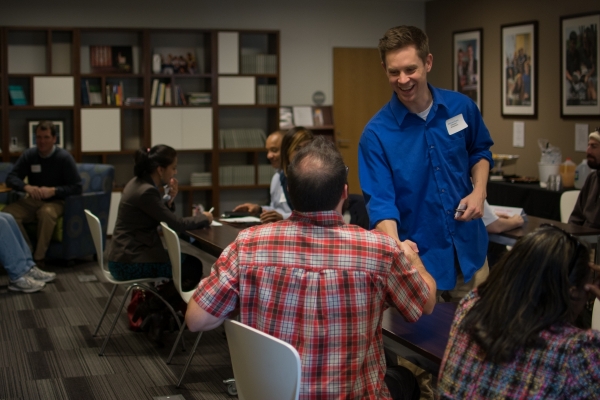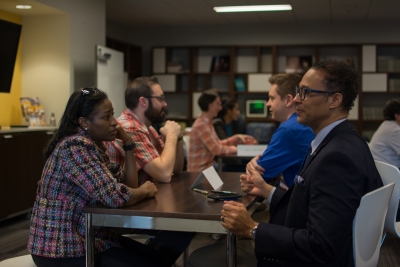“The College of Sciences is all about knowledge creation…” When my fellow liaison Marc Weissburg said this during a discussion of the role of the College of Sciences in promoting service learning and sustainability, I was immediately struck by its truth. He seemed to have captured in a single sentence what is at once exciting and frustrating about the College of Sciences at Georgia Tech—a place where cutting-edge research and teaching happen every day, but where our "created knowledge" so often ends up stuck within the confines of campus, in closed scientific journals, or in patent applications. As a liaison from the College of Sciences to Serve-Learn-Sustain (SLS), my job is to help direct (and help others direct!) that knowledge and effort to non-traditional channels, where it can benefit local communities and create a more sustainable world.
 Faculty in the College of Sciences teach a number of SLS-affiliated courses that address the core theme of “creating sustainable communities.” In the Honors Biological Principles course taught by Shana Kerr and Joe Montoya, students conduct research at the Atlanta Botanical Gardens, generating results with direct relevance to the residents of Midtown Atlanta. Emily Weigel’s Ecology Laboratory looks at metro Atlanta as an ecosystem and explores strategies to keep that ecosystem thriving. Monica Halka’s fascinating course on Urban Forests is particularly close to my heart, as I live down the street from the Kirkwood Urban Forest. Finally, several courses in the School of Earth and Atmospheric Sciences examine systems and sustainability on a global scale: Climate and Global Change, Habitable Planet, Physics of Weather, and Environmental Geochemistry are examples.
Faculty in the College of Sciences teach a number of SLS-affiliated courses that address the core theme of “creating sustainable communities.” In the Honors Biological Principles course taught by Shana Kerr and Joe Montoya, students conduct research at the Atlanta Botanical Gardens, generating results with direct relevance to the residents of Midtown Atlanta. Emily Weigel’s Ecology Laboratory looks at metro Atlanta as an ecosystem and explores strategies to keep that ecosystem thriving. Monica Halka’s fascinating course on Urban Forests is particularly close to my heart, as I live down the street from the Kirkwood Urban Forest. Finally, several courses in the School of Earth and Atmospheric Sciences examine systems and sustainability on a global scale: Climate and Global Change, Habitable Planet, Physics of Weather, and Environmental Geochemistry are examples.
An increasing number of the College’s research projects have local communities as either a direct or indirect subject. The Georgia Tech Urban Honeybee Project, led by Biological Scientist Jennifer Leavey, has cultivated hives on campus and studied the behavior of bees in urban environments. Their efforts are educating a new generation of beekeepers and shining a light on the challenges facing urban bee populations. Earth and Atmospheric Scientist Yuanzhi Tang has integrated research projects related to sustainable waste management and recycling into her courses on geochemistry. Undergraduate student Nicole Kennard and Biological Scientist Jeanette Yen are working on sustainable aquaponic systems for growing plants in urban areas. These examples point to the important role that the sciences can play in promoting biodiversity, resource and energy conservation, and equity.
In my own course, Chemical Principles II Laboratory, we have carried out several experiments with sustainability as an overarching theme. Students have designed and tested solar cells based on blackberry juice (mimicking photosynthesis in the blackberry plant), measured the concentrations of vitamins and minerals in various food products, and tested water samples for dissolved oxygen and chloride. My long-term vision is to return student-collected chemical data back to local communities, illuminating disparities in water quality. This semester, several students will participate in a workshop with Georgia Adopt-a-Stream to collect water samples from Proctor Creek in Atlanta’s Westside.
When I think about partnerships between the College of Sciences and SLS, I'm reminded of Nicole and Dr. Yen’s aquaponics systems, which combine plants with marine organisms and bacteria. The bacteria process the output of the marine organisms into minerals that the plants use to grow. Analogously, working with Serve-Learn-Sustain, the College of Sciences can help transform the work of students and faculty into resources that can help local communities thrive.
Faculty, students, or staff in the College of Sciences interested in getting involved with SLS can contact me to discuss opportunities at mevans@gatech.edu or (404) 385-8166.
Michael Evans is the First-Year Chemistry Laboratory Coordinator in the School of Chemistry and Biochemistry at Georgia Tech. He also serves as one of the College of Sciences SLS Liaisons.